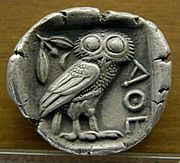- Glaucus (owl)
-
 Silver tetradrachm coin depicting owl of Athena
Silver tetradrachm coin depicting owl of Athena
In Greek and Roman mythology, Glaucus (Greek: Γλαῦκος, Glaukos, "glaring (eyes)"; compare Greek glaux, owl, of the same origin) is the symbolic owl of Athena or Minerva, respectively. Often referred to as the "owl of Athena" or "owl of Minerva", it accompanies Minerva in Roman myths, seen as a symbol of wisdom because the owl is capable of seeing even in the dark and of vigilance because the owl is awake at night.
The nineteenth-century idealist philosopher G.W.F. Hegel famously noted that "the owl of Minerva spreads its wings only with the falling of the dusk"—meaning that philosophy comes to understand a historical condition just as it passes away. Philosophy cannot be prescriptive because it understands only in hindsight.
“ One more word about giving instruction as to what the world ought to be. Philosophy in any case always comes on the scene too late to give it... When philosophy paints its gloomy picture then a form of life has grown old. It cannot be rejuvenated by the gloomy picture, but only understood. Only when the dusk starts to fall does the owl of Minerva spread its wings and fly. ” —G.W.F. Hegel, Philosophy of Right (1820), "Preface"
See also
Categories:
Wikimedia Foundation. 2010.
